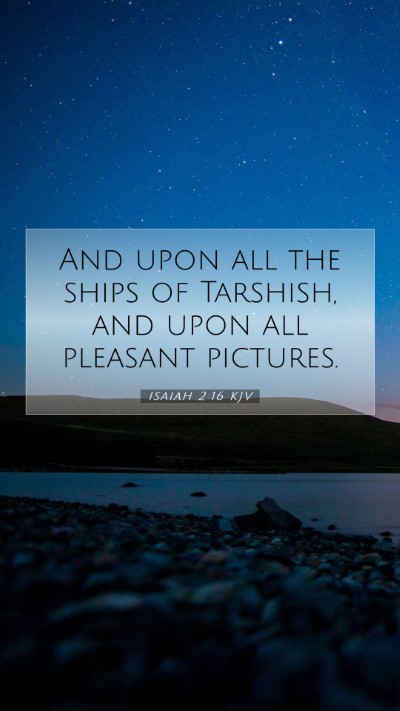Bible Verse Meaning and Commentary: Isaiah 2:16
Verse: Isaiah 2:16 "And upon all the ships of Tarshish, and upon all pleasant pictures."
Introduction
This verse from Isaiah highlights a prophetic vision regarding the fate of those who rely on the grandeur of their possessions and trade, specifically referencing the ships of Tarshish, noted for their distance and luxury. In seeking to understand the deeper meanings behind Isaiah 2:16, we turn to public domain commentaries from esteemed biblical scholars to gain insights into its significance in the broader context of Scripture.
Bible Verse Explanations and Interpretations
-
Historical Context:
Isaiah's prophecy is set during a time of great political and social upheaval for the people of Israel and Judah. The mention of Tarshish alludes to regions associated with wealth and trade, representing the luxurious imports that may have contributed to moral decline.
-
Theological Insights:
According to Matthew Henry, this verse serves as a warning against the idolatry of material goods, urging individuals to look beyond earthly possessions. He notes that the grandeur of such ships symbolizes the excess and pride that can lead a nation away from God's intended path.
-
Symbolism of Ships:
Albert Barnes emphasizes that ships, particularly those of Tarshish, represent the pride and reliance on human ingenuity and commerce. This highlights a contrast between earthly wealth and divine providence, suggesting that reliance on human constructs may lead to downfall.
-
Invitation to Reflection:
Adam Clarke suggests that the mention of ‘pleasant pictures’ refers to beautiful images or representations that may captivate one's attention but ultimately serve as false idols. This invites believers to examine the things they cherish and whether they detract from their relationship with God.
Understanding Scripture: Key Themes in Isaiah 2:16
The overarching themes found in Isaiah 2:16 resonate with a deeper understanding of the human condition regarding reliance on material wealth and the call to repentance. The verse challenges believers to navigate their faith amidst a world filled with distractions and superficial joys.
-
Idolatry of Materialism:
Isaiah's reference to the ships serves as a prophetic critique of placing value in wealth and material possessions. This commentary reminds readers that reliance on mere goods can create a barrier between themselves and God.
-
Consequences of Pride:
As discussed in the commentaries, the symbolic representation of ships suggests that pride in one's possessions can lead to spiritual and societal decline. This serves as a cautionary tale for contemporary society.
-
Call for Repentance:
The rejection of prideful and material pursuits is central to Isaiah's message, aligning with the broader biblical themes of humility and dependence on God.
Application in Daily Life
Understanding Isaiah 2:16 promotes introspection regarding personal values and priorities. Believers are encouraged to evaluate what they define as significant in their lives, challenging the norms of materialism endorsed by society.
Through personal reflection and discussion in bible study groups, individuals can cultivate a deeper understanding of how these themes apply to their lives, enhancing their bible study insights.
Bible Cross References
- Isaiah 2:12 - Discusses the impending judgment on prideful individuals.
- Isaiah 31:1 - Notes the futility of relying on horses and military power.
- Jeremiah 17:5 - Warns about the consequences of trusting in man over God.
Conclusion
In summary, Isaiah 2:16 serves as a profound reminder of the dangers posed by materialism and pride. Through the teachings found in biblical commentaries, believers are encouraged to seek a deeper relationship with God and apply the insights of this verse to their daily lives. This interpretation promotes a thoughtful engagement with Scripture and a commitment to align one's values with God's intentions.


